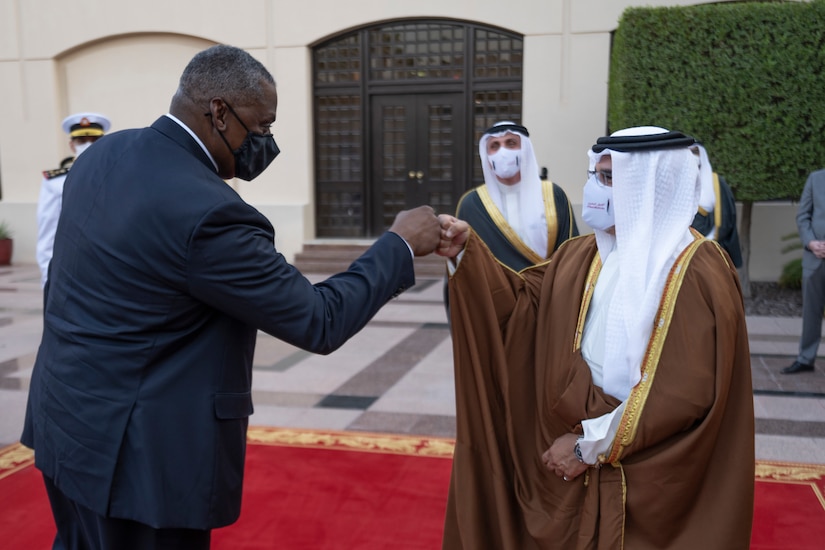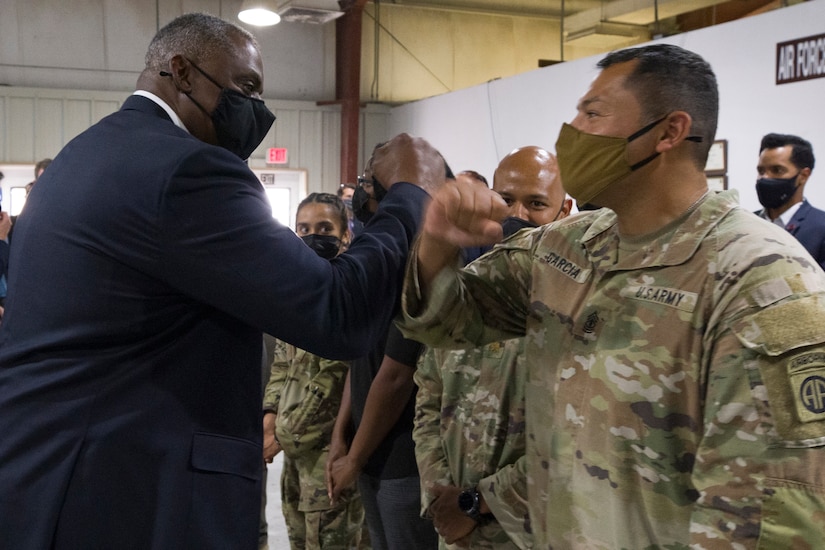Sept. 9, 2021 | , DOD News
Speaking to reporters who traveled with him to Qatar, Bahrain and Kuwait, Austin thanked leaders in each nation for their indispensable support.
The Gulf states were the first stop for Afghan refugees escaping the Taliban. "We asked them to help us out, and, on very, very short notice, they surged capability; they gave us access," Austin said during an interview in Kuwait before returning to the United States. "It was a demonstration of true partnership."

The United States has worked with Qatar, Bahrain and Kuwait for generations, and the militaries are accustomed to working together. "It's great to have partners like this, so that in times of need, we can very quickly turn to them, and they're very happy to do it," he said. "And they all felt they played a key role in helping out the Afghans who are transitioning to a new life."
U.S. Air Force C-17s took the evacuees to the Arabian Gulf nations where joint, combined teams screened and then readied them for further movement to Europe and eventually to the United States. Austin praised the international and interagency effort.
He noted how the effort ramped up in Qatar, for example. "One day they brought in 600 evacuees," he said. "About five days later, 17,000 evacuees showed up on very short notice. And they were able to manage that." The joint U.S.-Qatari team adjusted to the situation and adapted new practices to fit the needs.
The same sort of things happened at the refugee hubs in Kuwait and Bahrain.
In Kuwait, the secretary got a chance to speak with some of the service members who provided security at Hamid Karzai International Airport in Kabul, Afghanistan. He specifically spoke to Marines who were there when an Islamic State terrorist killed 13 U.S. service members and more than 200 Afghans. Speaking with the Marines "was very, very meaningful to me," he said.

The secretary had visited Walter Reed National Military Medical Center in Bethesda, Maryland, where those injured in the attack were evacuated, and he was able to give progress reports to the Marines about their comrades. "When I visited the Marines in a hospital, half of them are starting to do push-ups and stuff," he said. "Even though they were injured, they were trying to do PT. But that's to be expected with these young warriors; they always go above and beyond the call."
The secretary said the attack is a tough thing for these young service members to process. "But I think they have the support that's necessary to help them. They are there for each other, and they are a very impressive group."
If Americans ever question the benefits provided the U.S. by friends and allies, the non-combatant evacuation operation is a great example of why the global network of allies and partners is important, the secretary said. Austin was asked if the NEO could have happened without the allies in the Gulf and Europe, "The short answer is no," he said. "We wouldn't have had the legs. The aircraft could not have reached the United States." The situation on the ground in Kabul also did not allow for complete vetting of those evacuating.
"Our allies and partners have enabled us to do things that have never been done before," he said. "This was the largest airlift in history. The ability to shuttle back and forth and lift out as many people as we did, as fast as we did could not have happened without partners in this region and in Europe."
The global network is truly global. He noted the Philippines offered to help, as did other nations around the globe.
"I think that's one of the great strengths of the United States of America," Austin said. "We treasure our allies and partners. We work hard to make sure that we maintain good relationships," he said.
"At the end of the day, … you can't surge trust," he continued. "You have to, you have to work on these issues every day. You have to strengthen those relationships and build that trust … and that's what that's what we've done. So, in time of need, you see what happened here."
The United States is a global nation with global interests, Austin said. The security of the Arabian Gulf region is an important issue for the U.S., and its effort to increase trust and cooperation in the region will continue.
Austin said the world is watching as the Taliban takes over the government in Afghanistan to see if the group will allow terror groups to safely plan and train in the country. "I think the world community is kind of watching to see what happens and whether or not al-Qaida has the ability to regenerate in Afghanistan," Austin said. "We put the Taliban on notice that we expect for them to not allow that to happen."
The United States will maintain an over-the-horizon counterterrorism capability if a Taliban-run Afghanistan again becomes a terrorist haven, the secretary said. The capabilities the United States has will allow strikes against threats to the homeland.








No comments:
Post a Comment